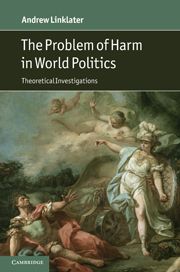Book contents
- Frontmatter
- Contents
- Preface
- Introduction
- 1 The concept of harm
- 2 The harm principle and global ethics
- 3 Harm and international relations theory
- 4 The sociology of civilizing processes
- 5 Historical sociology and world politics: structures, norms and emotions
- 6 Civilizing processes and international systems
- Conclusion
- Bibliography
- Index
2 - The harm principle and global ethics
Published online by Cambridge University Press: 05 June 2012
- Frontmatter
- Contents
- Preface
- Introduction
- 1 The concept of harm
- 2 The harm principle and global ethics
- 3 Harm and international relations theory
- 4 The sociology of civilizing processes
- 5 Historical sociology and world politics: structures, norms and emotions
- 6 Civilizing processes and international systems
- Conclusion
- Bibliography
- Index
Summary
The prominence of the obligation to avoid serious mental and physical harm in international law prompts the question of whether the modern society of states is making significant progress in harmonizing the duties that citizens have as members of particular communities with the obligations they owe all other people by virtue of shared humanity – alternatively, whether there have been advances in bridging the gulf between the standards that are generally observed in the relations between citizens in stable societies and the principles that govern external affairs (Linklater 1982/1990, 2007a: introduction). In the duty to avoid serious harm, and to cooperate to prevent harm they did not themselves cause, societies may have discovered the solution to the age-old problem of moral obligation in world politics. By agreeing that the most fundamental universal duty of all is to avoid serious harm, the species may be moving closer to answering the question of how separate political communities can co-exist more harmoniously. If so, the harm principle can be regarded as the key element of a long-term global civilizing process.
That approach to the ‘citizenship/humanity problem’ does not require the sacrifice of legitimate interests – only that societies refrain from promoting their ends by transferring unreasonable costs to outsiders. The antiquity of the theme is evident from its defence in Stoic thought where one first finds the claim that to cause unnecessary harm is to breach the most basic principle that members of humanity should observe in their dealings with each other.
- Type
- Chapter
- Information
- The Problem of Harm in World PoliticsTheoretical Investigations, pp. 76 - 111Publisher: Cambridge University PressPrint publication year: 2011



